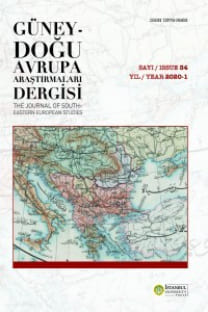TÜRK BOĞAZLARI SORUNUNA ÇÖZÜMLER: KISA BİR DEĞERLENDİRME
The article deals with the disc11ssio11s of the Soviet request that the Montreux Conventio11of1936 011 the Turkish Straits be revised. The Soviet U11io11 proposed that control of the waterway be vested i11 the Black Sea powers, and that defe11ses of the Straits become a joi11t u11dertaki11g of Turkey and the Soviet U11io11 rather than the respo11sibility of Turkey under international agreement. Turkey worried about this proposal because it was co11trary her full sovereig11ty over the Straits. The proposal of Soviet Russia which gai11ed considerable power after World War II, were appare11tly i11 order at 011ce to preve11t others from commanding the warm water approach to its Black Sea coasts; actually e11deavori11g to obtai11 a foothold at the Straits, to place itself i11 a position to exercise a hand i11 Mediterranea11 affairs. The other party of the question Western powers was wishi11g to protect the routes to the east and their valuable trade with the Levant. The co11ditio11s of navigation through the Straits are of direct interest to ma11y 11atio11s both 11ear a11d far. !11 this se11se their regulatio11 i11 modern times has bee11 governed by public law developed through internatio11al COf!fere11ces of 11atio11s justly co11cerned. No events of World War JI or si11ce have proved the wisdom of aba11do11i11g this practice. ft 's evaluated that the essential element i11 the settlement of the question depends upon the amicable adjustment of the competing security interests of the powers and an easi11g of the distrust between the Soviet Union and the Western powers.
Anahtar Kelimeler:
Boğazlar Meselesi, 1936 Montreux Sözleşmesi, Sovyetler Birliği, Türk- Sovyet İlişkileri
SOLUTIONS TO THE PROBLEM OF THE TURKISH STRAITS: A BRIEF APPRAISAL
The article deals with the disc11ssio11s of the Soviet request that the Montreux Conventio11of1936 011 the Turkish Straits be revised. The Soviet U11io11 proposed that control of the waterway be vested i11 the Black Sea powers, and that defe11ses of the Straits become a joi11t u11dertaki11g of Turkey and the Soviet U11io11 rather than the respo11sibility of Turkey under international agreement. Turkey worried about this proposal because it was co11trary her full sovereig11ty over the Straits. The proposal of Soviet Russia which gai11ed considerable power after World War II, were appare11tly i11 order at 011ce to preve11t others from commanding the warm water approach to its Black Sea coasts; actually e11deavori11g to obtai11 a foothold at the Straits, to place itself i11 a position to exercise a hand i11 Mediterranea11 affairs. The other party of the question Western powers was wishi11g to protect the routes to the east and their valuable trade with the Levant. The co11ditio11s of navigation through the Straits are of direct interest to ma11y 11atio11s both 11ear a11d far. !11 this se11se their regulatio11 i11 modern times has bee11 governed by public law developed through internatio11al COf!fere11ces of 11atio11s justly co11cerned. No events of World War JI or si11ce have proved the wisdom of aba11do11i11g this practice. ft 's evaluated that the essential element i11 the settlement of the question depends upon the amicable adjustment of the competing security interests of the powers and an easi11g of the distrust between the Soviet Union and the Western powers.
___
- -
- ISSN: 0378-3863
- Başlangıç: 1974
- Yayıncı: İstanbul Üniversitesi
Sayıdaki Diğer Makaleler
ABD'NiN BULGARiSTAN'IN KURTULUŞU KONULU MEMORANDUMU (20 ARALIK 1918)
TÜRKİYE'DE TARIMSAL YAPIDAKİ DEĞİŞİM SÜRECİNDE BAZI ÖNGÖRÜLER VE AVRUPA BİRLİĞİNE İHRACAT İMKANLARI
XV. VE XVI. YÜZYILLARDA YANBOLU ŞEHRİ
GÜNEY DOĞU AVRUPA ARAŞTIRMALARI ENSTİTÜSÜ/MERKEZİ'NİN KURULUŞU VE FAALİYETLERİ (Kuruluş 1969)
ABD'NİN KIBRIS POLİTİKASI VE TÜRK KAMUOYU (1950-1964) (Johnson Mektubu'na Kadar)
ANKHİALOS SAVAŞl'NIN SONUNA KADAR BİZANS-BULGAR İLİŞKİLERİ
TANZİMAT DÖNEMİ TAŞRA YÖNETİMİNDE SELANİK ÖRNEĞİ
TATAR ALİM KURBANALİ HACI HALİDOĞLU'NUN ORTA VE GUNEYDOĞU AVRUPA SEYAHATI
TÜRK BOĞAZLARI SORUNUNA ÇÖZÜMLER: KISA BİR DEĞERLENDİRME
